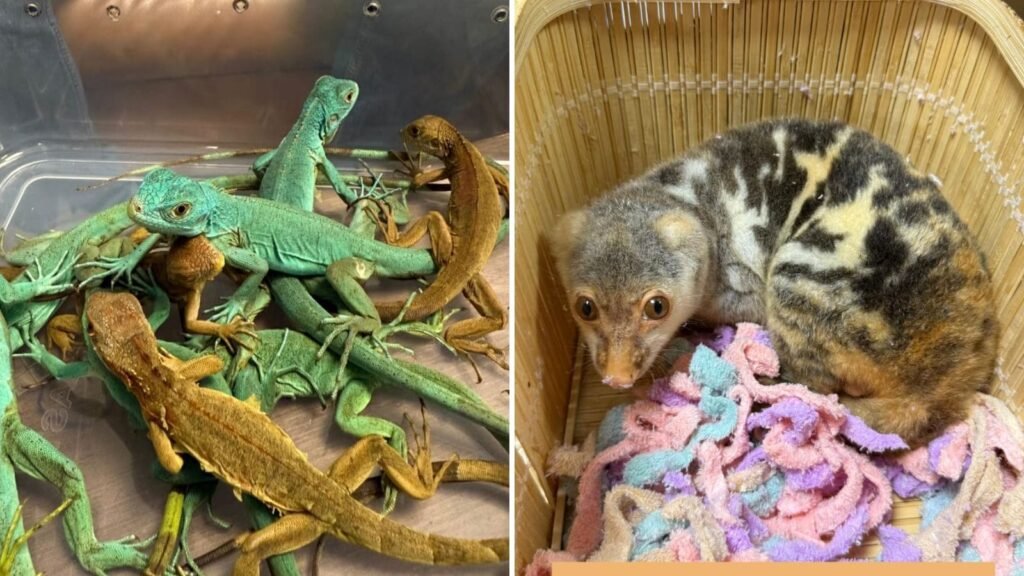Maharashtra Wildlife Trafficking: Over 350 Exotic Animals Smuggled from Bangkok Caught in Pune & Mumbai

In two months, 350 exotic animals that were trafficked from Bangkok were apprehended at the airports in Pune and Mumbai.
Over 350 exotic animals from Bangkok were confiscated by Pune and Mumbai customs in just two months, revealing an expanding wildlife trafficking network and environmental dangers.
More than 350 exotic animals have been confiscated by customs officers at the airports in Pune and Mumbai in the last two months, exposing a thriving wildlife trafficking network that starts in Bangkok and uses Maharashtra as a centre.
Six shipments of wild animals, including snakes, parrots, tortoises, rabbits, macaws, and rare reptiles, were seized by customs officers at Pune Airport and Mumbai’s Chhatrapati Shivaji Maharaj International Airport in June and July alone. Many of these animals are protected by the Convention on International Trade in Endangered Species of Wild Fauna and Flora (CITES).
Traffickers find Maharashtra appealing due of its infrastructure and connectivity. Typically, the animals are flown in through Bangkok and sent to places like Mumbai or Pune, where local handlers pick them up,” a customs department official stated.
The transporters typically don’t seem to know the ultimate destination or goal. “They only get paid to deliver the shipment,” he stated.
More than 20 unusual species, including Sumatran striped rabbits, Green Tree Pythons, and Double-eyed Fig Parrots, were found in the luggage of a traveller arriving from Bangkok in Pune on July 15.
The seizures have been far more common and concerning in Mumbai. Over 300 exotic animals were recovered as a result of at least five different interceptions between June 1 and July 12. Many of these creatures were packed in boxes, luggage, or plastic containers in conditions that generated major concerns about the transmission of zoonotic diseases and animal welfare.
Bangkok’s continued use as the starting point highlights its position in a complex and established smuggling network. “These are not a number of discrete incidents. According to Neha Panchmia, founder and president of RESQ Charitable Trust, which collaborates closely with the Maharashtra forest department, “it is a pattern—systematic, profitable, and deeply cruel.” “Smugglers treat animals like commodities and take advantage of India’s growing demand for exotic pets, ignoring the serious ecological and biosecurity risks,” Panchmai said.
Experts on wildlife caution that the effects of this trade go well beyond simple cruelty. “New illnesses can be introduced into India’s native ecosystems by exotic animals that are smuggled in from unregulated markets like Bangkok. Pawan Sharma, founder-president of RAWW (Resqink Association for Wildlife Welfare), which offers medical assistance to rescued animals, stated, “We’re not just dealing with smuggling here—this is a potential public health and conservation crisis.”
One of the largest markets for exotic animals is found in Thailand. Because they are popular prestige symbols in India, these creatures can sell for a lot of money—up to several lakhs, depending on the type. However, there is a history of pain, harm to the environment, and legal infractions behind each animal in someone’s drawing room,” he said.
Over 7,000 animals, or about 180 per month, have been intercepted along the Thailand–India route in the last 3.5 years, according to data from TRAFFIC, a non-governmental organisation that focuses on the wildlife trade. According to experts, this figure only accounts for a small portion of the overall amount trafficked.
Experts warn that seizures by themselves won’t break up the networks, despite increased enforcement by the forest, customs, and Wildlife Crime Control Bureau (WCCB) departments.
“This is a well-organized, international ring that necessitates a coordinated response across borders and agencies.” Furthermore, data across departments is still dispersed and awareness of wildlife crimes is still low, which makes it more difficult to take educated action, Sharma added.
The understaffing of India’s specialised anti-wildlife trafficking organisation is one of the main issues. For the WCCB to operate efficiently, additional staff and resources are required. The syndicates would remain two steps ahead without it,” he stated.
“Every animal seized is just the tip of the iceberg,” Panchmia said, echoing the notion. Reducing demand and altering attitudes are the larger battles. Customers must realise that purchasing an exotic wild animal is not a sign of prestige; rather, it is an act of cooperation in criminal activity.
Serious seizures
Pune Airport, July 15
Sumatran Striped Rabbits, Double-eyed Fig Parrots, and Green Tree Pythons were among the 20 wildlife species that were confiscated.
Mumbai Airport, July 12
Sumatran Striped Rabbit, Indochinese Box Turtle, Great Billed Parrot, and Meerkat seizure.
Mumbai Airport, June 29
Garter, Rhino Rat, Albino Rat, Kenyan Sand Boa, and California King were among the 16 snakes that were found.
Mumbai Airport, June 27
121 exotic animals, including Waigeo Spotted Cuscus and Green Iguanas, were confiscated from travellers arriving from Bangkok.
Mumbai Airport, June 10
Iguanas, tortoises, sunbirds, tarantulas, and sugar gliders were discovered hidden in traveller luggage.
Mumbai Airport, June 1
Indonesian Pit Vipers, Asian Leaf Turtles, and Spider-Tailed Horned Vipers were found in the luggage of an Indian national travelling back from Bangkok.
Looking for the perfect place to record? Check out the best podcast studio in Mumbai for professional sound and creative vibes.
Stay updated with the latest Trending, India , and World news. Get breaking news and key updates here on Maharashtra Election










